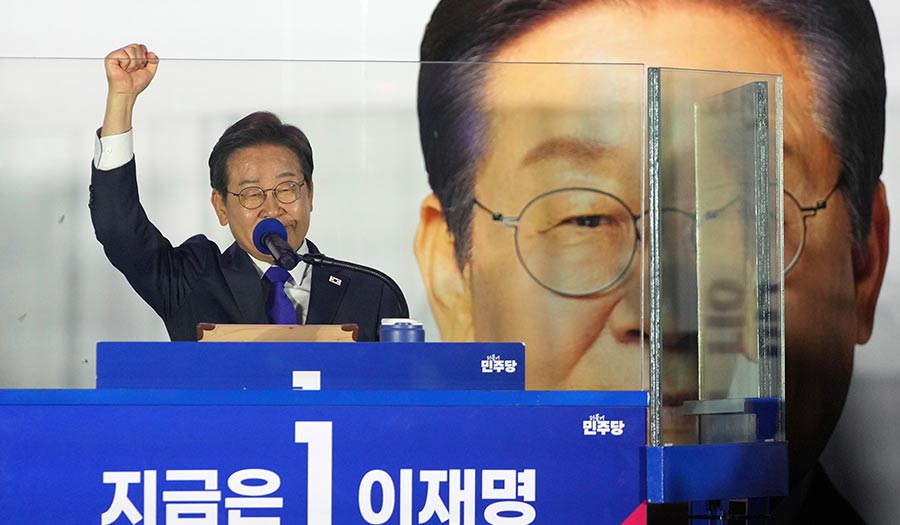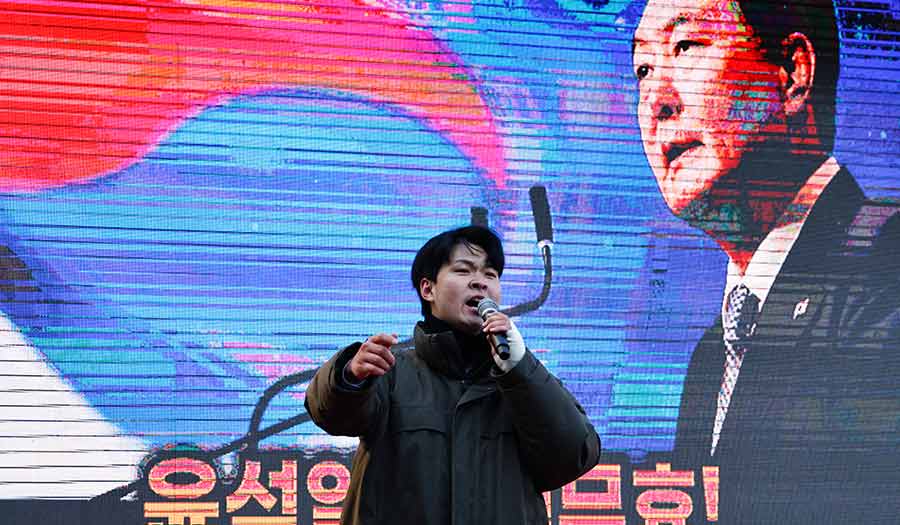 AP/Lee Jin-man
AP/Lee Jin-man
World News Desk
Learn the why behind the headlines.
Subscribe to the Real Truth for FREE news and analysis.
Subscribe NowSEOUL, South Korea (AP) – Lee Jae-myung, who rose from childhood poverty to become South Korea’s leading liberal politician vowing to fight inequality and corruption, will become the country’s next president on Wednesday after an election that closed one of the most turbulent chapters in the young democracy.
Mr. Lee, 60, the candidate of the liberal opposition Democratic Party, is taking office for a full, single five-year term, succeeding Yoon Suk Yeol, a conservative who was felled over his stunning yet brief imposition of martial law in December.
It was unclear whether Mr. Lee’s election would cause any major, immediate shift in South Korea’s foreign policy. Mr. Lee, previously accused by critics of tilting toward China and North Korea and away from the U.S. and Japan, has repeatedly stressed South Korea’s alliance with the U.S. as the foundation of its foreign policy.
The toughest external challenges awaiting Mr. Lee are U.S. President Donald Trump’s tariff policy and North Korea’s advancing nuclear program. But experts earlier said whoever becomes president cannot do much to secure major progress in South Korea’s favor on those issues.
As of 3:45 a.m. Wednesday, with over 99 percent of the votes counted, Mr. Lee obtained 49.3 percent of the votes cast in Tuesday’s early election, while main conservative contender Kim Moon Soo trailed with 41.3 percent—a gap that was impossible to overcome mathematically.
Preelection surveys have long suggested Mr. Lee appeared headed for an easy win, riding on deep public frustration over the conservatives in the wake of Mr. Yoon’s martial law debacle.
Even before Mr. Lee’s win was formally declared, Mr. Kim conceded, telling journalists that he “humbly accepts the people’s choice,” and congratulated Mr. Lee.
Earlier, Mr. Lee appeared before thousands of cheering supporters on Seoul’s streets. He did not formally claim victory, but reiterated his major policy goals, such as revitalizing the economy, promoting peace with North Korea and easing a domestic divide.
“Let us move forward with hope and make a fresh start from this moment on,” he said. “Though we may have clashed for some time, even those who did not support us are still our fellow citizens of the Republic of Korea.”
Pragmatic Diplomacy
Mr. Lee, who served as governor of Gyeonggi province and mayor of Seongnam city, has been a highly divisive figure in politics for years.
As a former child laborer known for his inspirational rags-to-riches story, Mr. Lee came to fame through biting criticism of the country’s conservative establishment and calls to build a more assertive South Korea in foreign policy. That rhetoric has given him an image as someone who can institute sweeping reforms and fix the country’s deep-seated economic inequality and corruption.
His critics view him as a dangerous populist who relies on political division and backpedals on promises too easily.
On foreign policy, Mr. Lee has vowed to pursue pragmatic diplomacy. He has promised to develop the alliance with the U.S. and solidify a trilateral Seoul-Washington-Tokyo partnership, a stance that is not much different from the position held by South Korea’s conservatives.
“We’ll have to now see if the pressures of office will cause Lee Jae-myung to govern from the center—at least when it comes to matters of national security and the alliance with the United States,” said Ankit Panda, an expert with the Carnegie Endowment for International Peace.
Mr. Lee said that he would pursue better ties with North Korea but acknowledged that it would be “very difficult” to hold a summit with North Korean leader Kim Jong Un anytime soon. This signals Mr. Lee will not likely initiate any drastic steps meant to improve relations with North Korea.
Experts say there are not many diplomatic options for South Korea as it tries to address Mr. Trump’s tariff hikes and calls for South Korea to pay more for the cost of the U.S. military presence, as well as North Korea’s headlong pursuit of nuclear weapons. Experts say that has made both Mr. Lee and other candidates avoid unveiling ambitious foreign policy goals.
Paik Wooyeal, a professor at Seoul’s Yonsei University, said that foreign policy strategists for Mr. Lee understand there is not much South Korea can do to bring about a denuclearization of North Korea. Mr. Paik said Mr. Lee also does not share the Korean nationalistic zeal held by ex-liberal President Moon Jae-in, who met Kim Jong Un three times during his 2017-22 term.
There are still hopes that diplomacy between the U.S. and North Korea could resume, with Mr. Trump repeatedly expressing his intent to reach out to Kim Jong Un. Mr. Lee has said that he would support Mr. Trump’s outreach.
“South Korea and the United States may be better aligned on engaging North Korea under the current constellation of leadership in both countries,” Mr. Panda said. “The two sides should begin consultations soon to ensure they’re aligned on their goals.”
Impact of Tariff Hikes
Mr. Lee’s government still could become engaged in “a little bit of friction” with the Trump administration, said Chung Jin-young, a former dean of the Graduate School of Pan-Pacific International Studies at South Korea’s Kyung Hee University.
Mr. Chung predicted Mr. Lee still will not be able to pursue overly drastic steps on foreign policy and security, given the country’s foreign exchange and financial markets are vulnerable to such changes.
Mr. Lee has preached patience over Mr. Trump’s tariff policy, arguing it would be a mistake to rush negotiations in pursuit of an early agreement with Washington.
On Monday, South Korean trade officials held an emergency meeting to discuss a response to Mr. Trump’s announcement that the U.S. will raise tariffs on steel and aluminum products to 50 percent beginning Wednesday. South Korea’s central bank last week sharply lowered its 2025 growth outlook to 0.8 percent, citing the potential impact of Mr. Trump’s tariff hikes and weak domestic demand worsened by the political turmoil of past months.
Healing Domestic Divide
The election serves as another defining moment in the country’s resilient democracy, but observers worry a worsened domestic divide could pose a big political burden on the new president.
The past six months saw large crowds of people rallying to either denounce or support Mr. Yoon, while a leadership vacuum caused by Mr. Yoon’s impeachment and ensuing formal dismissal rattled the country’s high-level diplomatic activities and financial markets.
Mr. Lee has promised to heal the national split, but his vow to thoroughly hold those involved in Mr. Yoon’s martial law stunt accountable has sparked concerns that he would use investigations to launch political retaliations against his opponents.
“The next question is just how Lee will represent and protect South Korea’s democracy,” said Soo Kim, a former CIA Korea analyst and geopolitical risk consultant.
“Will South Korea’s politics still remain focused on retribution, or will Seoul finally look beyond this and work constructively and progressively for the country’s best long-term democratic interests?” she said. “It’s a tall order for Lee.”
- Real Truth Magazine Articles
- ASIA
 South Korea’s Fragile Democracy
South Korea’s Fragile Democracy


